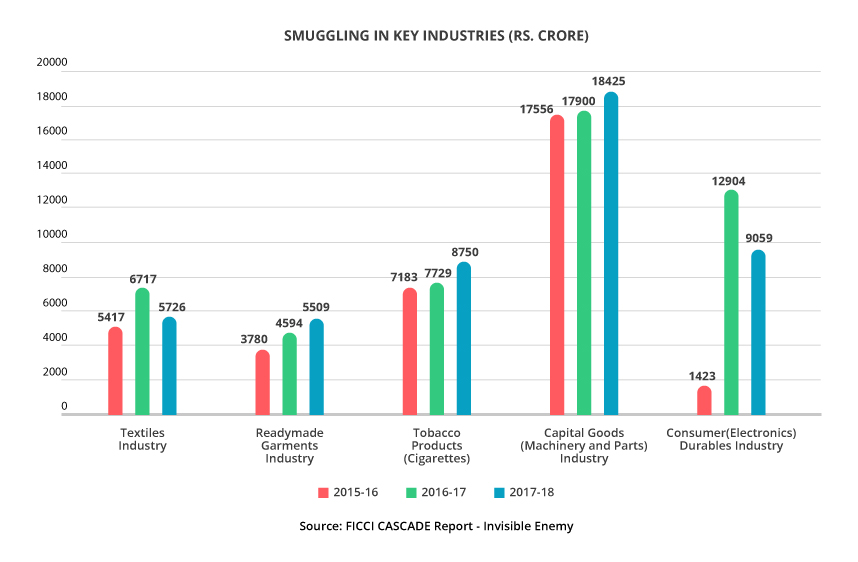
Managing Director, Netrika Consulting India Pvt Ltd, ASIS APAC Board Member
CFE, CII, FCIISCM, CATS, CCPS, CFAP

Managing Director, Netrika Consulting India Pvt Ltd, ASIS APAC Board Member
CFE, CII, FCIISCM, CATS, CCPS, CFAP

Co-Founder & Director-IPR
ICPS

Associate Director IPR, Northern & Eastern Region
Digital channels – websites, email messages, search engines, social media and smartphones – have profoundly changed the face of business profoundly. E-commerce now accounts for more than 13 per cent of the discretionary spending by consumers. Of course, fake products and services proliferate where customers go. Globalisation has brought tremendous uncertainty to the global supply chains and international trade. In this setting, customs officials around the world have a crucial role to play throughout finding a compromise between compliance and market facilitation.
Conducting anti-counterfeiting investigations involves identification and location of the suspected infringers. Obtaining evidence necessary to secure ex-parte seizure orders and other court orders to support enforcement.
Counterfeiting and piracy are still rising as a threat to society and the economy. Counterfeit or pirated goods are common throughout the world and across all sectors of the industry.
The amount sold by street corner counterfeiters and all other physical markets combined would soon overtake counterfeits in the digital world. Brands are losing hundreds of billions of dollars per year to fake or pirated content online. Brand hackers know that by imitating goods, they can make easy money.
Hazardous are those goods that directly harm the health and safety of consumers. In contrast, illegal trade in counterfeit goods is often connected with other serious crimes, such as money laundering and terrorist organisations funding.
Luxury fashion brands lose around $30.3 billion in sales to fakes products online, according to the 2018 Global Brand Counterfeiting Report. According to Ghost Information, Instagram's most counterfeited fashion brands including Louis Vuitton, Chanel, Gucci, Nike Fendi, and Balenciaga. The sale of these brands ' knockoff products does not only hurt their integrity and the bottom line; counterfeits were also linked to funding terrorism and other criminal activity rings.
These services typically involve the use of sophisticated online monitoring tools and strategies to identify and remove counterfeit goods from e-commerce platforms, social media sites, and other online marketplaces.
This includes the use of technology to monitor the internet and identify online sales of counterfeit or pirated goods as well as infringing content; locate sellers and supply chains; and identify jurisdictions and procedures for enforcement action.
Netrika Consulting provides cutting-edge Anti-Counterfeiting and Online Monitoring services to protect brands from illicit activities. Leveraging advanced technology and expert analysis, Netrika identifies and mitigates counterfeit products, ensuring brand integrity and consumer safety. Their comprehensive online monitoring solutions track unauthorized brand usage and counterfeit sales across digital platforms, enabling swift action against infringements. Trust Netrika for proactive measures to safeguard your brand reputation and combat counterfeit threats effectively.

Source: Global Brand Counterfeiting Report, 2018

There is a high need for anti-counterfeiting services in India. This is because of brand imitation, where the counterfeiter tries to copy the name, look, feel, and image of another brand which is very much in the public consciousness because of its popularity and services.
Here are some ways in which a counterfeiter goes about this:
Product piracy: Here, counterfeiters try to put the same brand name as well as the logo of a famous brand on their products or apparel. Knock-off copies of famous brands are available in India. The counterfeiter tries to cash in on the hard-earned reputation of an established brand.
Trade dressing: The fashion and the style of a competitor’s product are shamelessly copied, and the design is also not spared, barring a few modifications done by the counterfeiter.
Tech Leapfrogging: An established company takes quite some time to become well known, and many strategies are used to read the consumer market. If a rival brand waits it out and steps in after the leading company establishes itself. In that case the unfair advantage of having a pool of research and tech advances that are copied, and it is basically “standing on the shoulders of giants.”
Cloning: This method is that of having an original product and a stolen brand name of a biggie. If there are no patents in place or the absence of trademarks and copyrights, it makes it easier for clones to sell at lower prices.
Creative adaptation: This uses the original content and builds upon it, or they adapt it for use in another sphere of work.
There are some factors that affect piracy, and the foremost is time. Counterfeiters wait it out until a famous brand settles down, and then hijack the process, product, and content of the brand. Netrika Consulting, based in India, is a well-known company that has delivered results on anti-counterfeiting services time and again. Many well-known brands are their satisfied patrons, and if you have an issue with piracy and counterfeiting, they are the ones to call for a solution.
This system includes identifying illegal activity in social networks, search engines, electronic commerce platforms, and other channels. The firm then follows through with the removal of counterfeit offerings through “takedown” methods, among other actions.
What are the services included in anti-piracy and anti-counterfeiting?
Anti-Piracy is a service that may keep an eye on and remove content that has been illegally distributed online on websites, social media platforms, and P2P networks on behalf of the anti-piracy software’s users.
It is possible for counterfeiters to seriously harm a brand. It will have a significant effect if customers don’t believe a business sells real, high-quality goods. Additionally, it may be challenging for the brand owner to pinpoint the precise means by which counterfeiters get away with their crimes.
Electronics, stationary, food and drink, LPG, movies and music DVDs, petroleum products, luxury goods and fashion apparel, phones and computer accessories are among the products that are frequently imitated.